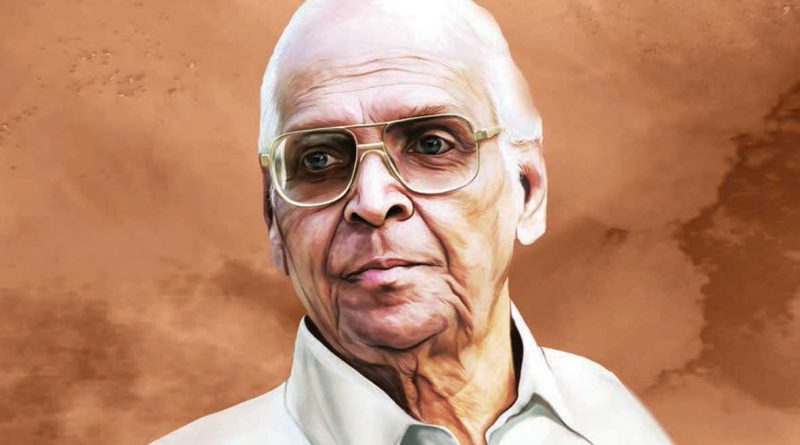The Love that Refuses to Let Go

From the balcony of the apartment where I live, I can see the city. The narrow greens amidst the densely standing concrete buildings, vehicles racing with heads and tails, and people walking hurriedly… Along with those familiar city scenes, a line from a song flows into my mind: “Play and laughter above, mud and twist below, outside a beauty who spreads smiles, the girlfriend who wouldn’t leave…” (“Kaliyum chiriyum mele, chaliyum chuzhiyum thazhe, purame punchiri choriyum sundari piriyam vidatha kamuki…”) These are lines from the song “Nagaram Nagaram 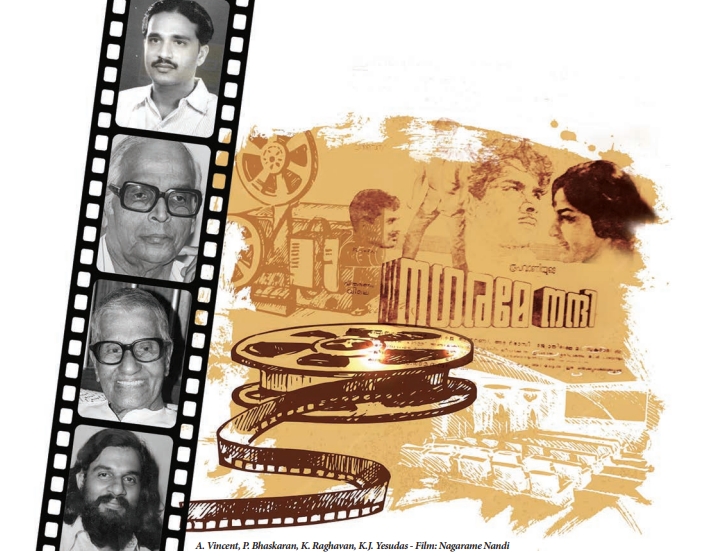 Mahasagaram” written by P. Bhaskaran for the 1967 film “Nagarame Nandi,” directed by A. Vincent. The music was composed by K. Raghavan; the singer: Yesudas. Wherever I end up in any city, that song echoes in my ears. How simply does Bhaskaran Master sketch the artificiality of the city through just two lines. Perhaps there’s some magic that makes even that false face appears delightful, a magic held by all cities. I arrive in each city determined to leave soon.
Mahasagaram” written by P. Bhaskaran for the 1967 film “Nagarame Nandi,” directed by A. Vincent. The music was composed by K. Raghavan; the singer: Yesudas. Wherever I end up in any city, that song echoes in my ears. How simply does Bhaskaran Master sketch the artificiality of the city through just two lines. Perhaps there’s some magic that makes even that false face appears delightful, a magic held by all cities. I arrive in each city determined to leave soon.
Eventually, unknowingly, we become part of that busy, noisy life. Like the girlfriend who won’t leave, the city embraces us, and we, without even trying to wriggle out, bask in that embrace, forgetting ourselves. That was Bhaskaran Master too, lost in thought. He, who had to uproot his life from the countryside to the city unexpectedly. Sitting in some hotel room in Madras, while writing the song for “Nagarame Nandi,” it must have been his own life and his hopes for the future that filled his mind; back then, he lived in rented rooms, dreaming only of a house of his own. The same song’s verse plaintively asks, “How shall I, in this swiftly flowing city, disguise my small hut? What if my coral island shatters in the ocean waves?” Isn’t that the same rustic who, unknowingly transformed from a native of a small hamlet called Chundel in Wayanad to a man of Kozhikode, then Kochi, and now Trivandrum? Even at this age, he harbors a longing to return to the purity of the village, if it still exists. Shouldn’t the city, like the girlfriend who wouldn’t let him go, let him go? To me, this city too is like the girlfriend who won’t let go. Even as he penned down the diverse narrative moments in cinema, the poet Bhaskaran infused his own soul into many songs.
The lines, “Today or tomorrow the lamp will extinguish, and then only pitch darkness,” come to mind. How simple, yet profound and thought-provoking, is the life truth hidden in those words? The moments when those lines and the song that contained them first flowed into my ears are still vivid in my memory. On a stormy Wayanad night, as wind and rain conspired to snatch away the electricity, I sat around a kerosene lamp with my younger brother and sister, loudly reciting that evening’s lessons to engrave them in our hearts.
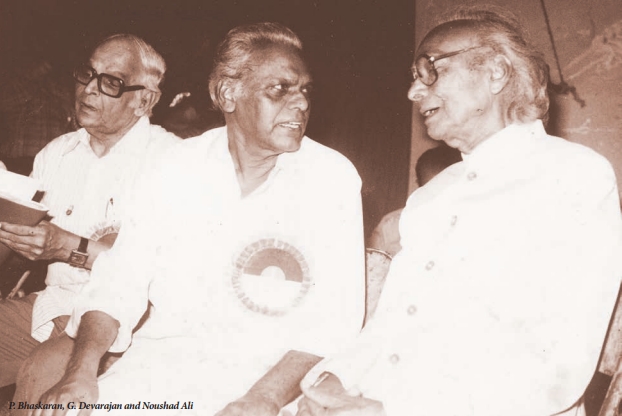 Unexpectedly, from the radio in the room, the song began to play in Jayachandran’s expressive voice: “Life is a poetry book, isn’t life a book of poems, where are the pages to write the calculations…”. In front of us flickered the oil lamp, and perhaps because the matter concerned the light of life, those lines imprinted themselves in the mind of the schoolchild then. We three were waiting for the oil to run out and the lamp to extinguish. It was then that father called from inside: “Come up, all three of you. Enough studying.” What joy could match sitting in the dark, enjoying the songs on the radio in those days? It was years later that I truly understood and absorbed the depth of Bhaskaran Master’s lyrics.
Unexpectedly, from the radio in the room, the song began to play in Jayachandran’s expressive voice: “Life is a poetry book, isn’t life a book of poems, where are the pages to write the calculations…”. In front of us flickered the oil lamp, and perhaps because the matter concerned the light of life, those lines imprinted themselves in the mind of the schoolchild then. We three were waiting for the oil to run out and the lamp to extinguish. It was then that father called from inside: “Come up, all three of you. Enough studying.” What joy could match sitting in the dark, enjoying the songs on the radio in those days? It was years later that I truly understood and absorbed the depth of Bhaskaran Master’s lyrics.
Has anyone else ever portrayed death, waiting at the doorstep with a ‘manchal’, in such a simple and “romantic” way in a song? Other lines from the same song also touched the heart. How relevant they are in these days filled with anxieties about the future. “Madhurakavyamithu marakkunnu, ithil Mandanmar kanakkukal kurikkunnu Koottunnu pinne kizhikkunnu, oduvil Koottalum kizhikkalum pizhaykkunnu ….” Isn’t it true? All our calculations keep going wrong in our lives. “We must savor each line, the joyful message sweet as nectar, today or tomorrow the lamp will extinguish, then only pitch darkness…” This advice gains a special significance in modern times. In Bhaskaran Master’s words, I see my own reflection. I recall that the pallavi of the song composed by Dakshinamoorthy in the film “Aswathy” (1974), directed by Jessy, sparked some controversy when it was released.
A recent issue of “Cinema Masika” featured an interview with Bhaskaran Master, where one question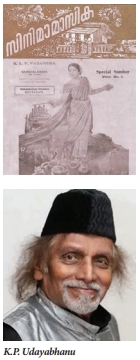 raised was: “Isn’t there a flaw in asking where are the pages to write calculations in a book of poetry?” “The flaw is indeed the point. No one would really write calculations in a book meant for poetry…” — this was Master’s witty response, as I remember it. Years later, when I first met Bhaskaran Master at the Alakapuri cottage in Kozhikode, that
raised was: “Isn’t there a flaw in asking where are the pages to write calculations in a book of poetry?” “The flaw is indeed the point. No one would really write calculations in a book meant for poetry…” — this was Master’s witty response, as I remember it. Years later, when I first met Bhaskaran Master at the Alakapuri cottage in Kozhikode, that 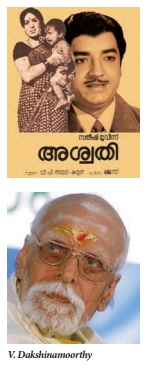 question and his answer once again came up in our conversation. I still remember him saying with a smile: “That song is me. It’s my view of life. The calculations of life are not meant for poets who roam in imaginative worlds. There are no transactions or profit and loss calculations in that dream world. Even when I ventured from the world of poetry into film production and other commercial fields, I never felt like it was a personal success.
question and his answer once again came up in our conversation. I still remember him saying with a smile: “That song is me. It’s my view of life. The calculations of life are not meant for poets who roam in imaginative worlds. There are no transactions or profit and loss calculations in that dream world. Even when I ventured from the world of poetry into film production and other commercial fields, I never felt like it was a personal success.
Ultimately, our domain is poetry and literature.” Those words shone with genuine insight. I have always felt Dakshinamoorthy’s creation “Kavyapusthakam” was a unique piece of music. Although it carried the touch of Hindola, it also had a Hindustani hue and the aesthetic beauty of a ghazal. Jayachandran effectively utilized the possibilities of improvisation in his rendition, especially evident in the line “Anagha Granthamitharo Thannu.” When combined with the rhythmic beauty of the tabla, it becomes a distinctive Swamigeetham. “Even today, when I hear that song, I reflect on how beautifully Master’s lyrics and Swami’s music blend together,” Jayachandran says. “Then, the utter darkness,” he sings, stirring a subtle sorrow somewhere deep within. A nostalgic evening spent at Udayabhanu’s house with singers Udayabhanu, Jayachandran, and their friend Manoharan, filled with songs and stories, remains in memory. Yielding to Udayabhanu’s request, one of the songs Jayettan sang that day was “Kavyapusthakam.” “Master’s meaningful lyrics…” — Udayabhanu remarked as he listened with his eyes closed. “What a feeling in Jayan’s voice…” In his final days, as I stood watching Udayabhanu lying alone and helpless in the bedroom of the same house, struggling against his ailments, weren’t those same lines unknowingly echoing in my mind?


